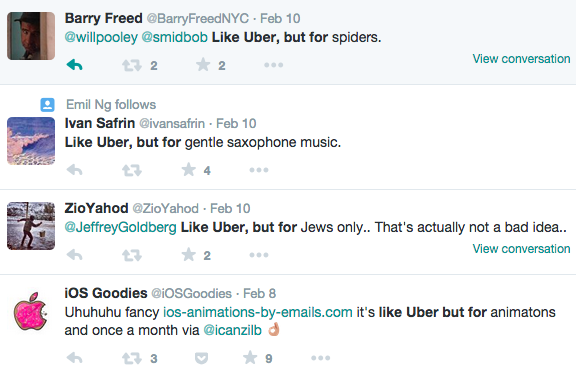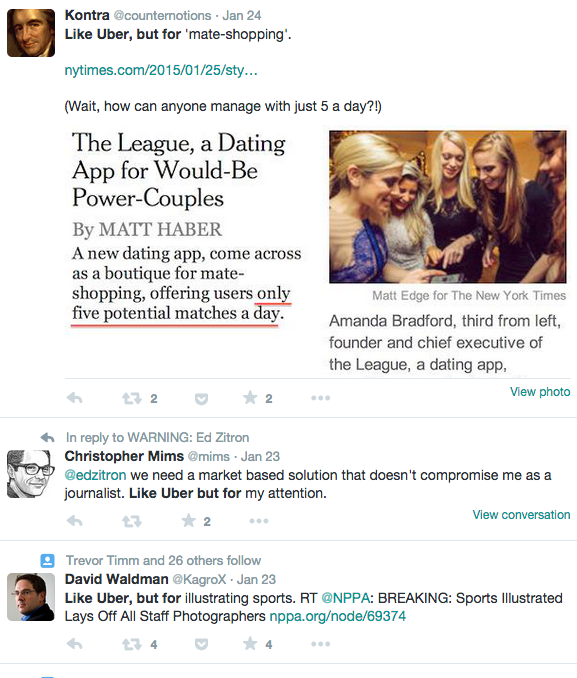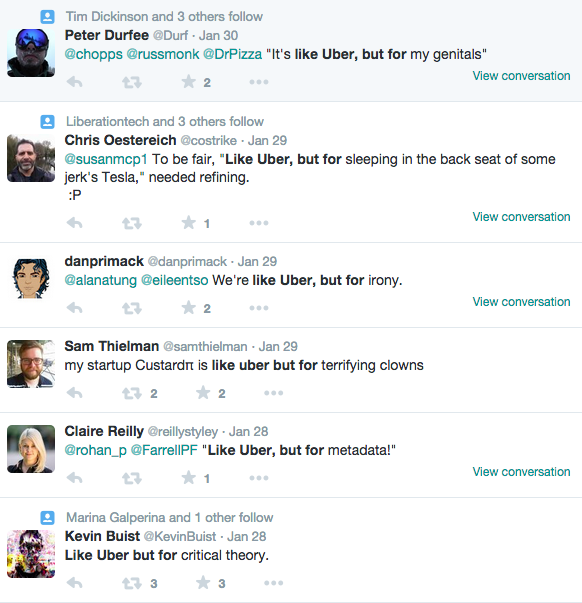Like Uber but for The D.
If you've spent any time following Tech Twitter, the insular community of entrepreneurs, venture capitalists, engineers, journalists, and interested onlookers who drive forward and comment on the day's tech news, you've probably seen some version of this joke:
Like Uber, but for the Republican presidential nomination: http://t.co/IgXW2AzgQZ
Right now, this convention is a way to cheekily present a thing. Literally anything. Like Twitter memes and tropes before it, "Like Uber but for" is the price of entry into some of Twitter's myriad clubs. It's a signifier that you're in on the inside of a cultural joke; a knowing wink about Uber's ubiquity as well as the thirsty pitching culture of the entrepreneur/tech class, and way to seem funny without really being funny.
And it's everywhere on Twitter.
Like Uber but for bridges
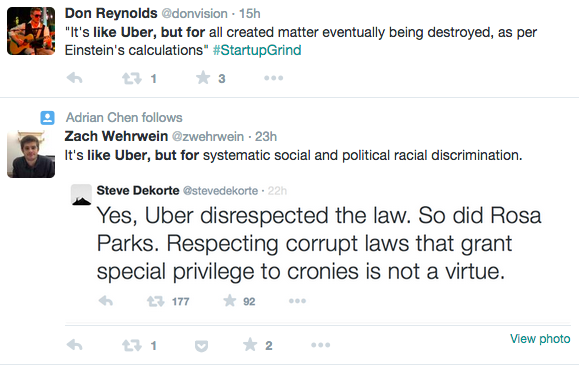
But it wasn't always that way. As with any Twitter joke, it started out simply enough. Not a year after ride-hailing giant Uber was founded, @grinding4ddub uttered the first "like Uber but for" as an earnest request:
Do they have an app like uber but for samgsung phones ?
And so it went for a blissful two and a half years! But as Uber's tentacles crisscrossed and enveloped the U.S., city by city, it went from a novelty app used almost exclusively by techies to a transformative, near-worldwide utility. Naturally, hungry entrepreneurs everywhere wanted to harness the power of this kind of push-a-button-on-your-phone-to-make-a-thing-happen-in-the-real-world products. Here's one of the earliest earnest examples of "Uber for X" on Twitter from December 2010:
Basically a app that works like Uber but for the evo. I've been spoiled lol @_Declare
And here's the first jokey instance of the "like Uber but for" convention on Twitter. It's a nerdy little quip referencing the then-still-small ride-hailing company from a tech worker who's well before his time. Little did Andrew Clay Shafer know that Uber would explode like it did and this inside-baseball tech joke would soon be Tech Twitter's favorite phrase:
like Uber but for URL shorteners
Ride-hailing copycats aside, the Uber model quickly became the go-to frame for startup pitches the same way "Tinder for X" has become the gold standard for dating app pitches. It's easily relatable, catchy, and, most importantly, it doesn't take too much brainpower to dream up. Like a cancer, it metastasized into hundreds of little tech tumors.
Congrats to our prez, @kevinfawley and the team at @touchdownspace on their beta launch. It's like Uber but for meeting/office spaces
The Swifto App Is Like Uber But for Dog Walking: http://t.co/Y9hqo2OxHd
Here's a short list pulled from Quora of some of the better known "Uber for X" ideas:
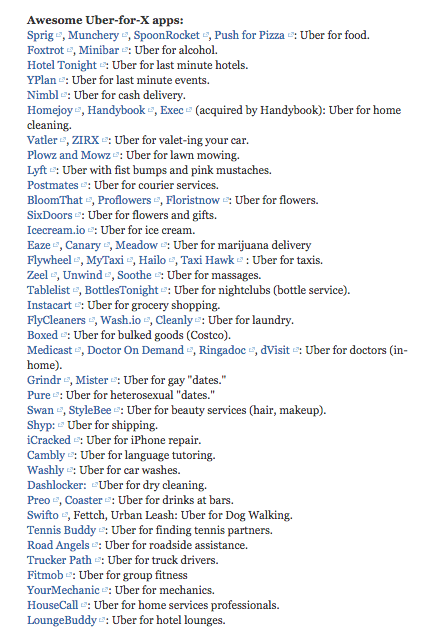
And soon the tech press picked up on the convention:




It got so bad that tech writer Kevin Roose actually found THIS ("the teleological end of the on-demand economy: an Uber for other Ubers") at last year's Tech Crunch Disrupt conference:
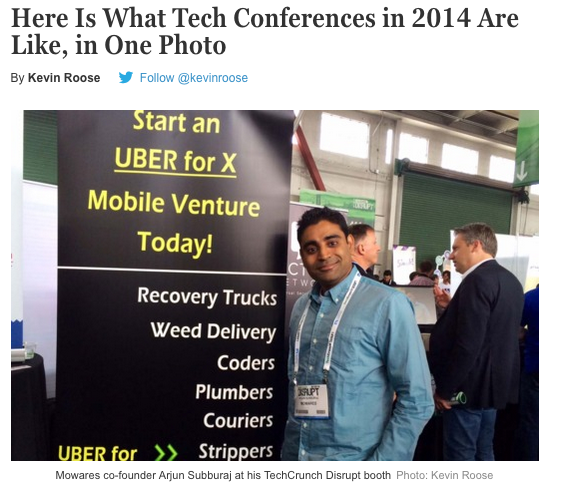
Having reached absurd saturation levels, "Uber but for X" became the perfect fodder for Tech Twitter's dad-with-pleated-jeans-and-a-pager sense of humor. The floodgates opened.
"It's like Uber but for licensed sex workers." No, we will not be making a "and the tip is included" joke this evening.
"It's like Uber but for assassinations. Talk about game changing technology!"
Its like Über but for curb-side yard waste pickup.
OH: „It’s like Uber but for space ships“
its like Uber but for wrapping presents.
Around 2013, the joke began to morph into a knowing meta-joke, a way to reference yet another played-out tech meme, a glib way for Tech Twitter to reference All Things Shitty in the startup world.
unflappable elevator pitch. RT @HeyVeronica: Digg Reader is like Uber but for cronuts
@rustyk5 @JessicaKRoy "It's like Uber but for displacing poor people"
like uber but for making america a meritocracy
It became an easy way to drop a snarky interjection of one's voice on any bit of news. Take this "like Uber but for," which was sent during a bout of internet outrage over a potato salad Kickstarter project:
Like Uber but for potato salad think-pieces.
Essentially, "like Uber but for" is a way to tell Twitter, Hey, I've seen that thing we're all talking about! It's a way to reference something in the moment while simultaneously distancing yourself from it, as if to say, I get it! Tech culture and the media ecosystem that covers it is largely intolerable and I want to talk about this but I'd like to do that somewhat ironically so as not to be made fun of!
More than anything else though, it's a signifier that lets others know you belong to one of Twitter's niche little clubs/communities.
Twitter is full of these little clubs, none of them exclusive. There's Tech Twitter, Politics Twitter, Media Twitter, Sports Twitter, Black Twitter, Night Twitter, Car Twitter, Ban Men Twitter, and countless others I'm leaving out. They aren't separated by a specific room or hashtag; there's no discernible organizational apparatus at all, other than the universal truth that, if you believe yourself a member of the club you will a) check in regularly and b) pay your dues by contributing to the maelstrom anytime something that's relevant to your club comes through your timeline. Entrance is easy, but acceptance is harder. And one of the keys to fitting in is to speak the language.
"Like Uber but for" is but one of these glossary terms. It's a signal to the rest of the club. And it makes perfect sense for that signal to be based around Uber, a company that's equal parts ambitious, exciting, terrifying, awful, important, and, most importantly, relevant. It's a company that perfectly captures our conflicted feelings toward the industry and its coverage and thus the perfect way to perpetuate Twitter's infinite feedback loop of seeking and rejecting approval.
